|
|
|
Sort Order |
|
|
|
Items / Page
|
|
|
|
|
|
|
| Srl | Item |
| 1 |
ID:
187071
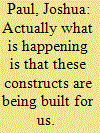

|
|
|
|
|
| Summary/Abstract |
It is widely accepted that race is socially constructed. Despite this, deference to race witnesses scholarship and activism becoming complicit in the reification of race and the reproduction of its effects. Gilroy describes ‘‘the pious ritual in which we always agree that ‘‘race’’’ is invented but then are required to defer to its embeddedness in the world and to accept that the demand for justice requires us nevertheless innocently to enter the political arenas it helps to mark out’. This article engages this contention through reflection on the political deployment of race in Southhall Black Sisters. Empirical data and postracial theory extend the analysis to examine an applied postracialism and to consider whether we have arrived at a new antiracist conjuncture. Ultimately, this theoretically informed and empirically engaged article examines the role of race in antiracist politics and reflects on its future as a tool for performing such principled labor.
|
|
|
|
|
|
|
|
|
|
|
|
|
|
|
|
| 2 |
ID:
187068
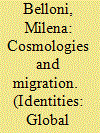

|
|
|
|
|
| Summary/Abstract |
This article argues that the concept of ‘cosmologies of destinations’ is a useful theoretical tool to provide an emic understanding of the social and moral meanings of migrants’ journeys. By this concept, I refer to the hierarchical representations of the world that orient migration journeys. Drawing from my multi-sited ethnography with Eritreans at home and abroad, I illustrate how migration destinations were mapped by my informants along an implicit but widely shared normative and moral scale, with different levels of perceived safety, individual freedom, social recognition and economic achievements. After charting the theoretical field concerning social imaginaries and cultures of migration, I show the importance of symbolic and moral structures for understanding my informants’ mobility choices at different stages of their migration process. I conclude by highlighting the potential of this concept to study the interplay of mobility and immobility, particularly in the framework of increasing constraints
|
|
|
|
|
|
|
|
|
|
|
|
|
|
|
|
| 3 |
ID:
187073


|
|
|
|
|
| Summary/Abstract |
Addressing research on migration governance, this article examines German pre-integration courses offered to Turkish marriage migrants in Istanbul. The courses were implemented in response to growing concern about the perceived poor integration of Muslim migrants and a high number of forced marriages. I argue that these courses are a micro form of biopolitical governance. Specifically, they are an attempt to generate internalized ways of being and knowing that are desired by the state, which I call ‘membership cultivation.’ As such, the courses are not precisely aimed at restricting migration as in other pre-integration measures, nor are they mainly reinforcing symbolic boundaries and teaching liberalism as in post-migration German civic integration courses. Rather, the courses attempt to re-make migrants with regards to morality, culture and gender. Using participant observation and in-depth interviews, this research examines the disciplinary mechanisms targeting migrants’ transformation to enhance our understanding of the biopolitics of pre-integration governance.
|
|
|
|
|
|
|
|
|
|
|
|
|
|
|
|
| 4 |
ID:
187070


|
|
|
|
|
| Summary/Abstract |
In this paper, we problematise the relationship between racism and immigrant integration policies. First, we approach racism from its geopolitical/institutional/governmental logic and contextualise the emergence of integration policies across the European Union. Then, we put into dialogue the fieldwork materials of our research projects, analysing intersections between the EU and Spanish integration policy frameworks. Despite the inclusive and proactive rhetoric often expressed by integration policies, we illustrate the existence of an ‘elective affinity’ between racism and integration by focusing on: (1) the construction of migrants as a problematic ‘object’ of governmental intervention; (2) the reduction of racism to an individual pathology and the underestimation of its institutional/structural dimensions; (3) the reproduction of epistemic racism through the discourse on European (and national) values.
|
|
|
|
|
|
|
|
|
|
|
|
|
|
|
|
| 5 |
ID:
187072
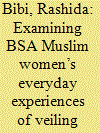

|
|
|
|
|
| Summary/Abstract |
In The Souls of Black Folk W.E.B Du Bois conceptualised arguably two of the most significant and powerful theories of race and racism, that of ‘the Veil’ and ‘double consciousness’. This paper utilises the concept of the veil both literally, in the case of non/veiling acts of British South Asian (BSA) Muslim women living in Oldham, but also metaphorically, through the Veil, as a form of social and cultural exclusion of Muslim women in everyday interactions. The paper argues that the use of the Veil and double consciousness, is able to highlight the extent to which Muslim women actively reflect upon hegemonic discourses of the veil as oppression and veil as respectability which shape understandings of them. The paper contends that an analytical use of ‘double consciousness’ in particular, can highlight the nuanced experiences of BSA Muslim women’s everyday lives.
|
|
|
|
|
|
|
|
|
|
|
|
|
|
|
|
| 6 |
ID:
187069
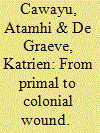

|
|
|
|
|
| Summary/Abstract |
This paper provides a critical analysis of the narratives of Bolivian adoptees in Belgium. We discuss how the adoptees look back upon the imagery of family and culture invoked by their parents and wider social environment and how this imagery has affected their sense of self and belonging. We argue that the adoptees’ narratives testify of a discursive struggle to reclaim control over their lives and histories. While they draw upon prevailing discourses that tend to imagine adoptees as ‘wounded’, they do so in diverse, complex and at times contradictory ways. Their perceptions of the familial and cultural imagery show that while they do not entirely reject the idea of being hurt, they seem to make a shift from explaining this ‘wound’ in individual-psychological terms to explaining it in social terms, making use of emerging anti-racist and decolonial perspectives.
|
|
|
|
|
|
|
|
|
|
|
|
|
|
|
|
| 7 |
ID:
187075
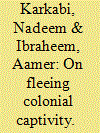

|
|
|
|
|
| Summary/Abstract |
This article examines artistic production in the formerly Syrian land of the Jawlan (Golan Heights) as a way of tracing Indigenous politics of decolonization. Through consideration of the Jawlanis’ longstanding refusal to integrate into the Israeli state, the article demonstrates how Yasser Khanger’s poetry and the music of the band Toot Ard are practices of artistic fugitivity that flee colonial captivity. It argues that these cases offer two different modes of metaphoric and actual fugitive mobility. Khanger’s is a mental movement toward disengagement from the settler-colonial state while physically staying in place. It evades subjugation by redefining confinement as a tool for staging poetic insurgency. The second mode is based on physical nomadic movement in international space while embracing a stateless condition. Fugitivity here becomes a movement that forces the Indigenous stateless self into the outside world, to realise the possibility of decolonisation by transgressing nation-state borders.
|
|
|
|
|
|
|
|
|
|
|
|
|
|
|
|
| 8 |
ID:
187074
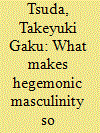

|
|
|
|
|
| Summary/Abstract |
Research on ‘hegemonic masculinity’ needs to more specifically examine its hegemonic properties by analysing how masculine ideals embodied by white men have become pervasive and widely-accepted by men of colour through their voluntary compliance and consent. This paper analyses the influence of hegemonic masculinity on the lives of Japanese American men. Because they have adopted hegemonic masculinity as an idealised standard that they aspire to, but cannot attain, their subordinate masculinity is construed as inferior and effeminate, constraining their romantic power over women. Such negative assessments are shared by Japanese American women, who are also under the pervasive influence of hegemonic masculinity. In response, some Japanese American men attempt to appropriate the qualities of an idealised manliness in public performances, indicating how they continue to conceive of their masculinities in hegemonic terms. Although a few of them valorised Asian American manhood in order to challenge hegemonic conceptions, such alternative masculinities may eventually be appropriated by hegemonic masculine discourses to perpetuate pre-existing racial inequalities.
|
|
|
|
|
|
|
|
|
|
|
|
|
|
|
|
|
|
|
|
|